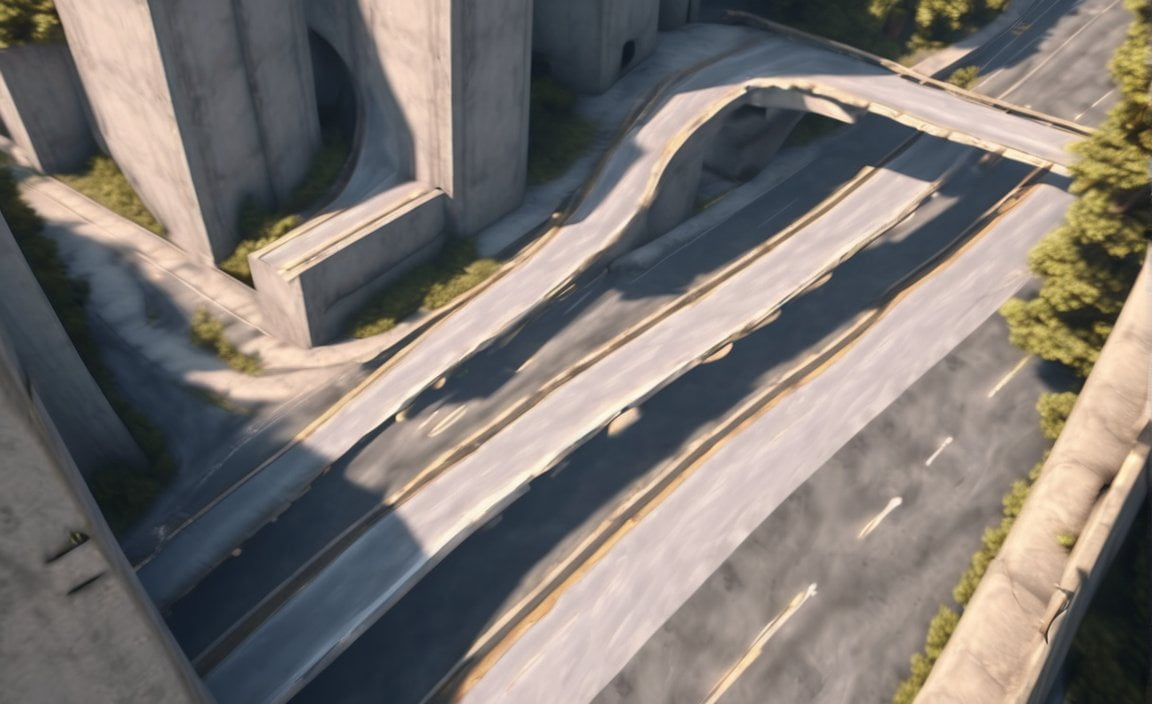Are you considering implementing concrete roads for your infrastructure project but unsure of the potential advantages and disadvantages? Look no further. In this article, titled “Pros and Cons of Concrete Roads: A Comprehensive Analysis,” we delve deep into the world of concrete roads, comparing and contrasting their benefits and drawbacks. Whether you’re interested in the durability, sustainability, cost-effectiveness, or safety aspects of this road type, our unbiased and comprehensive analysis will provide you with the insights you need to make informed decisions. Say goodbye to uncertainty and hello to a well-informed choice concerning your transportation infrastructure. Let’s explore the pros and cons of concrete roads together.
Key Takeaways:

- Cement concrete roads have high durability, strength, and a long lifespan.
- They can withstand extreme temperatures and weather conditions.
- The initial construction cost of concrete roads is usually higher than other road solutions.
- Constructing concrete roads can be a time-consuming process.
- Maintenance of concrete roads involves regular inspections and repairs for cracks and potholes.
- Concrete roads have a negative impact on the environment due to carbon emissions produced during construction and mining of raw materials.
- However, they help conserve natural resources as they are primarily made from limestone.
- Concrete roads have better load-bearing capacity compared to asphalt roads.
- They are less likely to be slippery in bad weather, improving road safety.
- Some disadvantages of concrete roads include potential cracking and warping due to temperature variations and increased noise under iron-tyred traffic.
Advantages and Disadvantages of Concrete Roads

Advantages of Concrete Roads
Concrete roads bring forth a multitude of benefits that make them an attractive choice for transportation infrastructure. Let’s explore these advantages in detail:
1. Durability and Strength
One of the primary advantages of concrete roads is their remarkable durability and strength. These roads are built to withstand heavy traffic loads and can handle immense pressure without experiencing significant deterioration. Unlike other road surfaces, concrete roads have a longer lifespan, reducing the need for frequent repairs or reconstructions.
2. Minimal Maintenance
Concrete roads require minimal maintenance compared to alternative road solutions. Once constructed, they can last for decades with little need for frequent maintenance. This benefit not only saves time and effort but also reduces ongoing maintenance costs.
3. Weather Resilience
Concrete roads excel in withstanding extreme weather conditions and temperature variations. From scorching hot summers to freezing cold winters, these roads remain resilient and relatively unaffected by weather-induced wear and tear. This characteristic ensures a safer and more reliable driving experience for road users.
4. Improved Safety
In terms of road safety, concrete roads take the lead over their counterparts. They offer better traction, making them less slippery during inclement weather or rainfall. This improved grip reduces the likelihood of accidents caused by vehicles skidding on the road surface. By prioritizing safety, concrete roads help protect drivers and passengers alike.
5. Load-Bearing Capacity
Concrete roads boast a superior load-bearing capacity, making them suitable for heavy-duty usage. These roads can accommodate heavy vehicles, such as trucks and buses, without suffering from structural damage or deformation. This advantage makes concrete roads an excellent choice for highways, industrial areas, and regions with extensive commercial transportation.
Disadvantages of Concrete Roads
While concrete roads possess numerous advantages, it’s crucial to consider their drawbacks before making decisions regarding infrastructure projects. Let’s delve into the disadvantages associated with concrete roads:
1. High Initial Construction Costs
One significant disadvantage of concrete roads lies in their higher initial construction costs. Constructing concrete roads requires specialized equipment, skilled labor, and meticulous planning. As a result, the upfront investment for concrete roads tends to be higher compared to alternative road surfaces.
2. Time-Consuming Construction
The construction process for concrete roads can be time-consuming. The various layers involved, including the base layer, concrete mix, and surface, require careful placement, curing, and finishing. Consequently, constructing concrete roads often takes longer than other road solutions, potentially causing delays in project timelines.
3. Maintenance Requirements
Concrete roads necessitate regular inspections and repairs to maintain their functionality and appearance. Over time, cracks and potholes can develop, requiring timely attention and repairs. Failing to address these maintenance requirements promptly may lead to more extensive damage, compromising the road’s durability and safety.
4. Environmental Impact
Concrete roads have a negative impact on the environment. The construction process generates carbon emissions, contributing to climate change. Additionally, mining raw materials for concrete production further depletes natural resources. While concrete roads use limestone, a readily available material, the environmental footprint associated with their construction remains a valid concern.
5. Potential for Cracking and Warping
Due to temperature variations and settlement, concrete roads are susceptible to cracking and warping over time. Extreme heat or freezing temperatures can cause the concrete to expand or contract, leading to surface deformations. These issues may require additional maintenance and repairs, adding to the overall costs of maintaining concrete roads.
Considering both the advantages and disadvantages, it becomes evident that concrete roads offer durability, strength, and improved safety. However, the higher initial costs, maintenance requirements, and potential for cracking should be carefully evaluated in light of project budgets and long-term sustainability goals.
In Conclusion
Concrete roads provide a reliable and long-lasting solution for transportation infrastructure. Their durability, high load-bearing capacity, and improved safety make them a preferred choice in many scenarios. Nevertheless, decision-makers must weigh these advantages against the higher construction costs, potential maintenance needs, and environmental impact. By thoroughly assessing the specific requirements and goals of each project, stakeholders can determine whether concrete roads are the optimal choice for their transportation infrastructure needs.
To learn about the advantages and disadvantages of rail transport, click here.
Curious about the benefits and drawbacks of roads? Discover more by clicking here.
If you’re interested in exploring the advantages and disadvantages of train travel, don’t miss out on this insightful article here.
Concrete Road Advantages
Concrete roads are a popular choice for infrastructure projects due to their numerous advantages. In this article, we will explore the benefits of using concrete roads, providing you with a comprehensive analysis of their advantages. So, let’s dive in!
Durability and Longevity
One of the key advantages of concrete roads is their high durability and strength. These roads are built to last, with a lifespan that exceeds many other pavement options. The use of concrete as the primary material ensures that these roads can withstand heavy traffic loads and the test of time. Concrete roads are less prone to damage caused by weather conditions, making them a reliable and long-lasting solution for transportation infrastructure.
Minimal Maintenance
Concrete roads require minimal maintenance compared to other types of road surfaces. Due to their inherent durability, they don’t deteriorate quickly, reducing the need for frequent repairs or resurfacing. This advantage translates into lower maintenance costs and less disruption to traffic flow. Concrete roads are designed to withstand the rigors of regular use, making them an excellent choice for areas with heavy traffic or extreme weather conditions.
Weather Resistance
Concrete roads excel in their ability to withstand extreme temperatures and weather conditions. They can resist the expansion and contraction caused by temperature variations, reducing the likelihood of cracks and potholes. Whether it’s scorching heat or freezing cold, concrete roads maintain their structural integrity, providing a smooth and safe surface for vehicles. This feature makes concrete roads ideal for regions with extreme weather patterns.
Environmental Friendliness
Concrete roads offer environmental advantages compared to other paving materials. While their construction process may produce carbon emissions, concrete roads play a role in conserving natural resources. The primary components of concrete, such as limestone, are readily available, reducing the need for excessive mining and extraction. Additionally, concrete roads can be recycled and reused, further minimizing their impact on the environment.
Safety and Performance
Concrete roads provide excellent safety and performance benefits. Their smooth surface offers better traction, reducing the risk of accidents, especially in wet or slippery conditions. Concrete roads are less likely to become slick or develop potholes, ensuring a safer driving experience for motorists. Moreover, these roads have a higher load-bearing capacity compared to asphalt roads, making them suitable for heavy vehicles and freight transportation.
Cost-Effectiveness in the Long Run
While the initial construction cost of concrete roads may be higher compared to other road solutions, their long-term cost-effectiveness must be taken into account. Concrete roads have a longer lifespan and require less maintenance, resulting in lower overall costs over time. The durability and minimal repairs needed contribute significantly to the cost-efficiency of concrete roads, making them a wise investment for infrastructure projects.
Conclusion
Concrete roads offer a range of advantages that make them a viable choice for transportation infrastructure projects. With their high durability, minimal maintenance requirements, weather resistance, environmental friendliness, safety, and cost-effectiveness, concrete roads provide a solid foundation for efficient and sustainable transportation networks.
Key Takeaways:
– Concrete roads are highly durable and long-lasting.
– They require minimal maintenance and have a longer lifespan compared to other road surfaces.
– Concrete roads can withstand extreme temperatures and weather conditions.
– They offer environmental benefits by conserving natural resources and being recyclable.
– Concrete roads provide safer driving conditions and better load-bearing capacity.
– While initial construction costs may be higher, concrete roads are cost-effective in the long run.
Sources:
– HPD Consult. “Advantages And Disadvantages Of Cement Concrete Roads.” Retrieved from source.
– The Constructor. “Advantages And Disadvantages Of Cement Concrete Roads: What You Need To Know.” Retrieved from source.
FAQ
Q1: What are the advantages of concrete roads compared to asphalt roads?
A1: Concrete roads have high durability and strength, require minimal maintenance, and can withstand extreme temperatures and weather conditions.
Q2: What are the disadvantages of concrete roads?
A2: Concrete roads have higher initial construction costs compared to other road solutions, and the construction process can be time-consuming. They also require regular inspections and repairs of cracks and potholes.
Q3: How does the durability of concrete roads compare to asphalt roads?
A3: Concrete roads have high durability and strength, making them a long-lasting pavement option. They also have better load-bearing capacity compared to asphalt roads.
Q4: Are concrete roads environmentally friendly?
A4: While concrete roads have a negative impact on the environment due to carbon emissions during construction and the mining of raw materials, they also help conserve natural resources as they are made primarily from readily available limestone.
Q5: Do concrete roads improve road safety?
A5: Concrete roads are less likely to be slippery in bad weather, improving road safety. However, they may produce increased noise under iron-tyred traffic.
- Mastering Leader in Spanish: The Complete Guide - April 19, 2025
- Uncovering Surprising Parallels: England Size Compared to US States - April 19, 2025
- Old Mexico Map: Border Shifts 1821-1857 - April 19, 2025
















